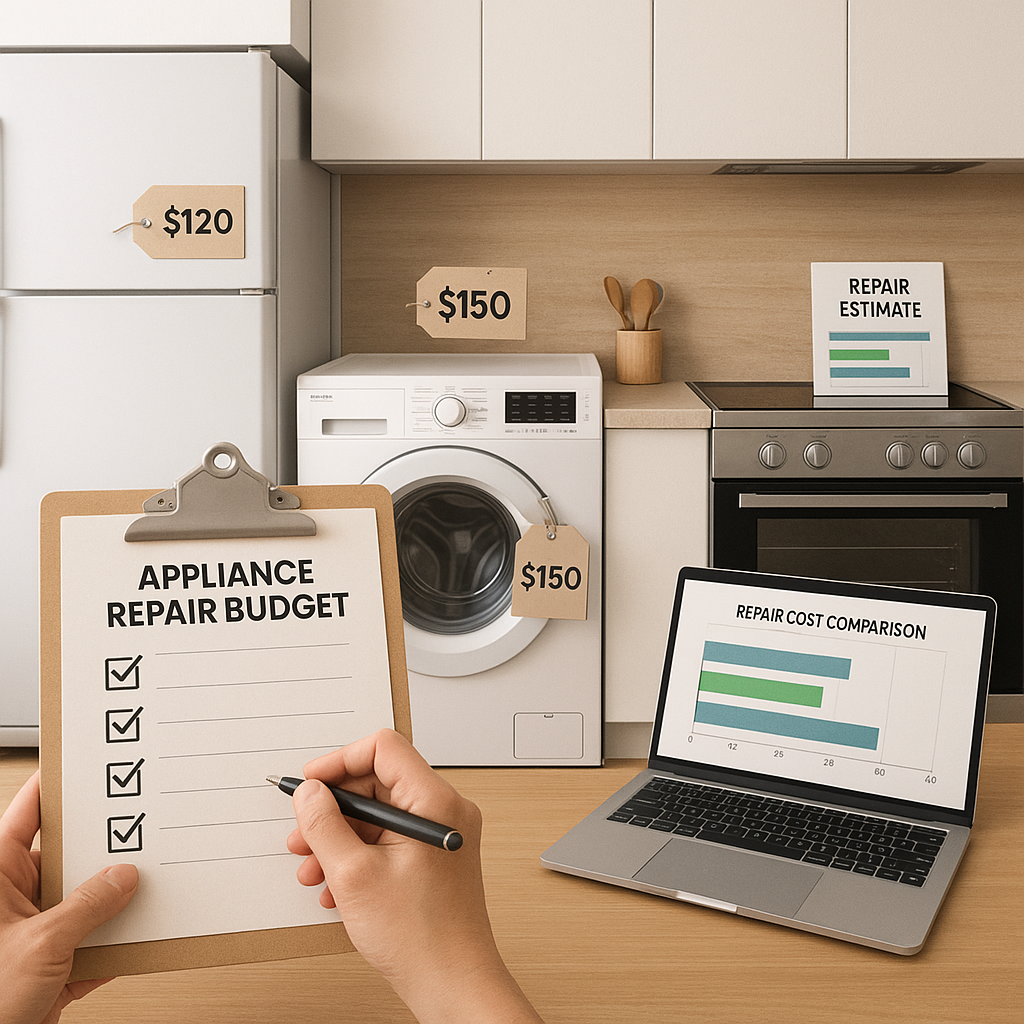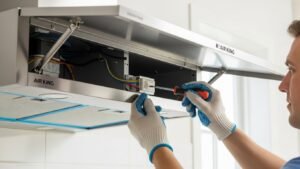Understanding appliance repair costs can be daunting. Many factors influence these costs, from the type of appliance to the complexity of the repair.
Homeowners often wonder how much they should budget for potential repairs. Knowing the typical costs can help you plan better.
This guide will explore the various factors that affect appliance repair pricing. We’ll cover common repairs for washing machines, dishwashers, and more.
You’ll also learn about service call fees and labor rates. This information will help you make informed decisions about repairs.
Whether you’re considering DIY repairs or hiring a professional, understanding these costs is crucial. Let’s dive into the details of appliance repair expenses.
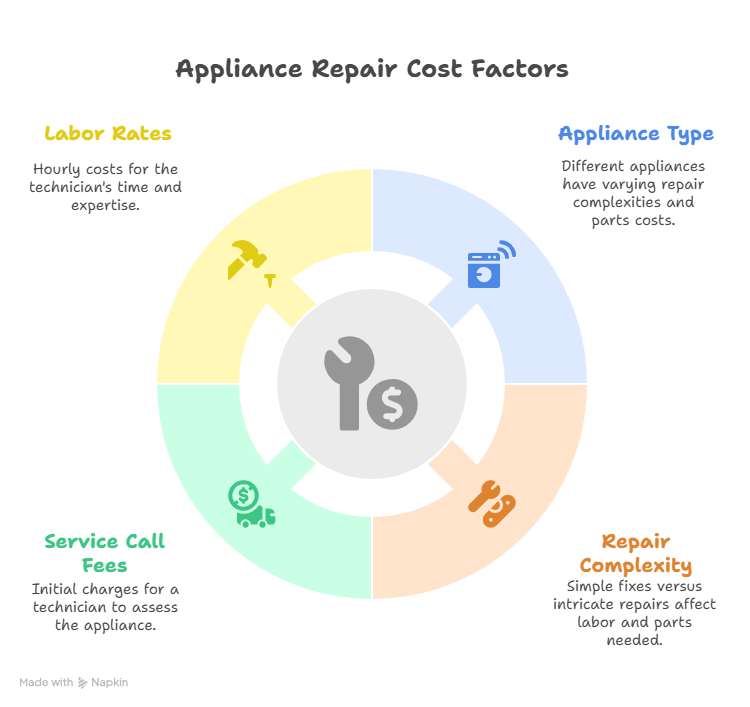
What Influences Appliance Repair Costs?
Several factors influence appliance repair costs. Understanding them helps in planning repairs efficiently.
First, the type and brand of the appliance play a significant role. High-end brands and models with advanced features often have higher repair costs.
Another factor is the complexity and type of the repair needed. Simple repairs are less costly compared to intricate or extensive issues.
Additional cost factors include:
- Age of the appliance
- Availability of parts
- Geographic location and local labor rates
These aspects combine to determine overall repair expenses. By considering them, you can make informed choices regarding appliance maintenance. Being aware of these influences prepares you for unexpected repair bills.
Need Same-Day Washing Machine Repair In South Central Pennsylvania? Click Here!
Typical Appliance Repair Prices by Type
Appliance repair prices vary based on the appliance’s function and complexity. Knowing typical costs can help with budgeting. Let’s explore some common appliances and what you might expect to pay for repairs.
Firstly, washing machines are a household staple. They require maintenance to stay functional. Their repair costs generally range from $100 to $400. Specific issues like a door lock replacement can cost around $150.
Dishwashers also experience wear over time. Fixing them could set you back between $150 and $300. The price depends on the problem’s nature and severity.
Here’s a brief overview of potential repair prices:
- Washing machine: $100 to $400
- Dishwasher: $150 to $300
- Microwave: $50 to $200
- Refrigerator: $200 to $400
Prices can change based on several factors. These include labor rates, part availability, and appliance brand. Staying informed helps in managing potential repair expenses efficiently.
Washing Machine Repair Costs
Washing machines encounter issues that need timely resolutions. Repairing them can be costly if delayed. Understanding these costs is crucial for effective financial planning.
Repair costs for washing machines typically span a wide range. Simple belt replacements start at around $120. More intricate problems like transmission repairs may reach up to $500.
Common washing machine issues and their costs include:
- Door lock repair: Around $150
- Bearing replacement: $150 to $300
- Transmission repair: $200 to $500
Repair prices can also depend on the washer’s brand. For example, Samsung washers might incur higher charges due to unique components. Maytag and GE repairs generally align with industry standards. Being proactive about minor faults can prevent major repair expenses.
Dishwasher Repair Prices
Dishwashers help in streamlining kitchen chores. However, they occasionally require repairs. Knowing typical prices can help avoid sticker shock.
Dishwasher repair costs range from $150 to $300. The severity and type of problem influence these charges significantly.
Common dishwasher issues include:
- Control panel malfunctions
- Water leakage
- Heating element failures
Professional repair fees vary based on the problem and dishwasher model. Keeping an eye on small issues can prevent them from escalating into costly repairs.
Other Common Appliance Repair Costs
Households use a variety of appliances beyond washers and dishwashers. Each comes with its own set of repair costs. Let’s consider some typical charges.
Refrigerators, often the workhorses of the kitchen, may need repairs ranging from $200 to $400. The costs depend on the issue, such as compressor failures or coolant leaks.
Other common appliances and their repair costs include:
- Microwaves: $50 to $200
- Ovens: $100 to $300
- Dryers: $100 to $400
Keeping up with regular maintenance can minimize these expenses. Understanding typical repair costs aids in preparing for potential issues. This awareness helps in mitigating unwelcome surprises in your repair budget.
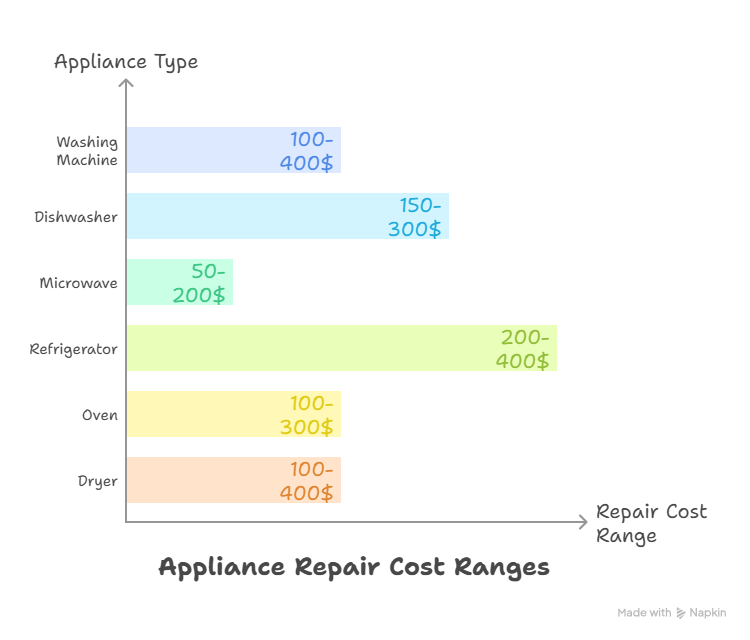
Service Call Fees and Labor Rates
Understanding the costs of service calls is vital when budgeting for appliance repairs. A service call fee typically ranges from $50 to $100.
This fee may cover the technician’s visit and diagnosis. However, it often excludes labor and part costs for the actual repair. It’s crucial to clarify what’s included when scheduling a visit.
Labor rates vary depending on the technician’s expertise and location. Here’s a quick overview of service-related charges:
- Service call fee: $50 to $100
- Hourly labor rate: $50 to $150
- Parts and materials: Varies based on repair needs
Knowing these rates helps in managing repair expenses effectively.
DIY vs. Professional Appliance Repair
Deciding between DIY and professional repair can impact your budget significantly. DIY repairs can save on labor costs and offer a sense of accomplishment.
However, they carry risks like voiding warranties or causing further damage. Professional repairs, while costly, provide expertise and assurance. Professionals often offer guarantees, reducing concerns over recurring issues.
Consider the following when choosing between DIY and professional repair:
- Complexity of the repair
- Potential warranty issues
- Skill level required for safe completion
Selecting the right path helps manage costs and ensures appliance longevity.
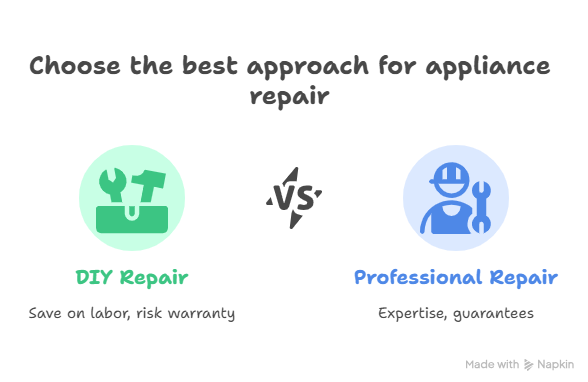
How to Save on Appliance Repair Costs
Saving on appliance repair costs requires proactive strategies. Regular maintenance can minimize breakdowns and extend appliance life. Simple cleaning and timely part replacements can prevent expensive fixes.
Another way to save is by comparing quotes. Contact multiple repair services for estimates and analyze their rates and service offerings. Doing this ensures fair pricing and prevents overpaying.
Consider warranties and service plans offered by manufacturers or retailers. These plans often cover regular repairs, providing budget relief. Implementing these tactics helps keep repair costs manageable:
- Schedule regular maintenance
- Compare repair estimates
- Utilize warranty plans
Common Causes of Fridge Water Leakage: Troubleshooting Guide
When to Repair vs. Replace Your Appliance
Deciding between repairing or replacing an appliance can be tricky. Consider the appliance’s age and condition. If repairs cost more than half the price of a new unit, replacement might be smarter.
Think about energy efficiency too. Older models can be expensive to run. If a newer model saves on utility costs, replacing might pay off. Weigh the following factors when deciding:
- Repair costs vs. replacement cost
- Energy efficiency savings
- Appliance age and overall condition
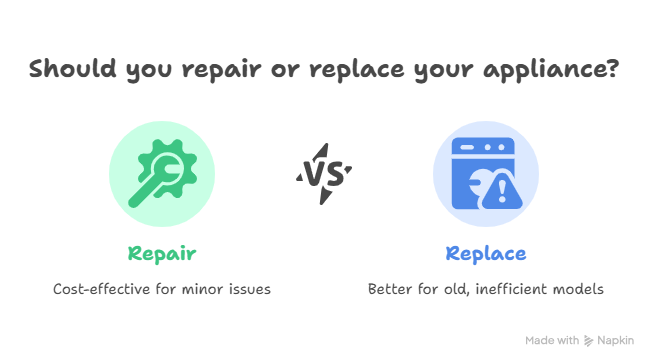
Key Takeaways and Final Tips
Understanding appliance repair costs is vital for budgeting. Keep these tips in mind to manage repair expenses effectively:
- Get multiple quotes for a fair price.
- Regular maintenance can prevent costly repairs.
- Consider the age and efficiency of your appliance when choosing to repair or replace.

